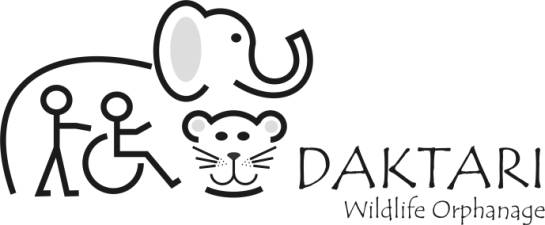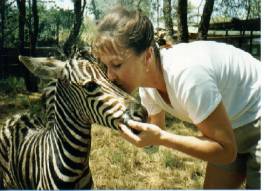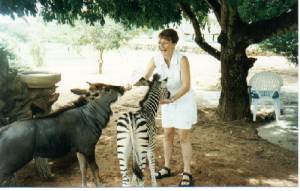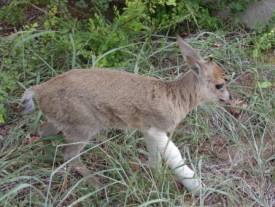| 
http://africanorphanage.com
DAKTARI – A UNIQUE INITIATIVE FOR PEOPLE WITH DISABLITIES!
 |
When we were younger, there was a TV program called Daktari. It was about a family in Africa, who looked after and raised many different types of orphaned wild animals. As kids we loved it and I remember getting deeply emotionally attached to the different animals.
Subsequently, having grown up in the bush in Africa and through my work as a ranger, I have taken care of many orphaned animals, all the way from small bush babies, giraffes, elephants and lions - even injured birds that had flown into power lines or windows. |
 |
My wife, Michèle also used to watch Daktari in France where she grew up. Already then she vowed to live in Africa one day and to look after animals herself. Her dream came true when we met on a game reserve, and she was able to assist in hand-raising a baby zebra which had been attacked by lions, an orphaned wildebeest, and two small orphaned warthogs whose mother had been killed by lions. Since then, there have been many more |
Michele Merrifield and her colleagues managed to save this baby zebra, which was attached by a lion. It was badly mauled, and only through love and dedication could it have survived. The companionship of Michele and the baby Gnu (wildebeest) were, we believe, the essential catalysts.
A very good friend is a quadriplegic. The joy he had (and us!) when we spent time together and he was able to help in raising these animals inspired an idea. We learnt, through our friend, that there is always a way to ‘make a plan' so that he could assist in much of the day-to-day work needed to look after the animals. We rose to the challenge and modified or altered tools so that he could assist the animals nevertheless! Thus ‘making a plan' is central to what Daktari is about.
 |
Ed Bailey, our quadraplegic friend from America, with a baby lion cub, abandoned by its mother because it was the runt of the litter and much small than his siblings.
The idea took shape and eventually we decided to set up a charity where people from all walks of life, underprivileged, handicapped or simply in need of a break or an adventure could have the opportunity of caring for animals in need and learn about nature. At Daktari they will all work together as one team - we will not segregate by race, religion, ideology or physical condition. |
 |
Julie the duiker was caught by poachers. They broke both front legs so she could not run away. They did not want to kill her immediately as the meat would go rotten in the heat. They would kill her later, when they were ready to eat her. |
We have set ourselves a great challenge: Our aim is to give people a chance to make themselves useful, to show them that they are needed, encourage them to take responsibility and let them be proud of their work and contribution to conservation. At the same time we want to offer animals a chance to survive in a world where nature has to retreat more and more in the face of human development. Hence, ‘doing good' , to people and animals is equally important to us. If every person on this planet has these two simple tenets, perhaps the world will be a better place to live in?
Daktari is not run by amateurs – it is run by experienced people who, if they do not know what to do, know whom to ask! It is run by people who have a common dream – and have the love and dedication to do it. For us, Daktari is a chance to share our world and some of the magical experiences that we have had in the bush over the years with others and it is thus immensely rewarding. It is a great character building experience for anyone that joins us and we hope that many more projects like this are started in the rest of the world and that our visitors share the knowledge and experiences they have gained!
Daktari is situated near the Kruger Park in South Africa, on a private reserve of 700 hectares, containing numerous plains game, but none of the “big five”. The closest town is Hoedspruit in the Limpopo Province. In the area there are many attractions, game drives in big five reserves, hot air ballooning, white water rafting, tours to the Kruger Park, reptile park, rehab centres, cheetah breeding project, Blyde River Canyon and many more!
We would be more than happy to tell you more about the project, and our accommodation – just email or call. If you would like to get involved in the project – any help is greatly appreciated! Contact details are on our web page:
http://africanorphanage.com
Conservation for the disabled
An ex-Zimbabwean and his French wife are launching a new wildlife orphanage in Limpopo, South Africa, which will be marketed to disabled and otherwise disadvantaged guests who would like to take an active role in wildlife conservation. KERRY SIMPSON describes the project's beginnings and hopes for the future.
That good old Zimbabwean phrase “make a plan” is one of the mottos on which an exciting new venture, Daktari Wildlife Orphanage, is being built. Dreams are starting to come true for Ian and Michele Merrifield, proud founders of the 700-hectare Daktari project.
Daktari, unlike other wildlife projects in the area, is not a rehabilitation centre. It caters for the animals that can't be rehabilitated, either because they have serious injuries that prevent survival in the wild, or because they are too tame. It is unique in Limpopo for that reason alone, but further than that, it's also aimed at bringing wildlife conservation to those who wouldn't normally have access: the disabled and otherwise disadvantaged.
Their “make a plan” motto derives from their need to do exactly that when a friend of theirs, wheelchair-bound as a quadriplegic, wanted to help them care for wildlife. They discovered that with a little love and effort, most obstacles could be overcome, enabling their newly-disabled friend to take part in caring for the animals and their environment.
The name “Daktari” was borrowed from a TV programme that both Ian and Michele watched as children, about a family in Africa who looked after many types of orphaned wild animals. Ian, born and raised in Zimbabwe, became a game ranger as an adult, and Michele, originally from France, made a trip to Tshukudu Game Reserve, Limpopo, to fulfil her dream. She has stayed in South Africa ever since her first treasured experience: hand-raising a baby zebra which had been attacked by lions.
Their dreams grew after they met and they decided to form Daktari as a non-profit company so that people from all walks of life, who have an affinity for animals, could experience loving and caring for animals that need it. Daktari does not segregate or judge people by race, religion, creed, ideology or physical condition. Ian and Michele hope that by inviting donations, sponsorship and income from paying visitors, they will be able to generate a profit that can be used to fund education and experiences for the financially disadvantaged (of any race or ability). They have already taken a young boy called Thabo under their wing.
Thabo first took an interest in the project before it was launched, when Michele saw him looking at the animal they were caring for and invited him in to see close up. Thabo's fascination and enthusiasm for learning sparked Michele's thirst for sharing her experience, and Thabo soon became a frequent visitor. Michele's measure of success with Thabo is that he is now sad when animals are hurt, particularly by poachers – when he first came to her, he regarded animals purely as meat and had little compassion for them. She sees him as a valuable educator for the other youngsters in his community, and hopes he will have a positive impact on his environment. This fits with their other tenet: “to do good”. Ian and Michele have been lucky enough to obtain the 700 hectares on permanent loan from friends, but the costs involved in maintaining and upgrading the facilities are tremendous. They have so far used their own money to fund improvements to two of the “rondavels” (traditional round thatched houses) which have ramp access and a wheelchair-friendly bedroom and bathroom. However, they still have a great deal to do before they will be able to invite paying guests to visit or stay. Their long list of requirements includes items as diverse as bricks, towels, desk, satellite phone, electric cable, borehole pump, pillows, gum poles and an operating table for animals. They would also like volunteers to help them market the project.
Anyone who would like to contribute money, items or time should contact Daktari on:
+27 (0)15 795 5219 or email tradingpost@mweb.co.za

© 2005 The Zimbabwean |
They would also love to hear from anyone interested in taking advantage of their facilities when completed. See further info at: www.africanorphanage.com |
Please contact the editor@anAurora.co.uk with any stories or features that you would like us to publish for you.
Top |

